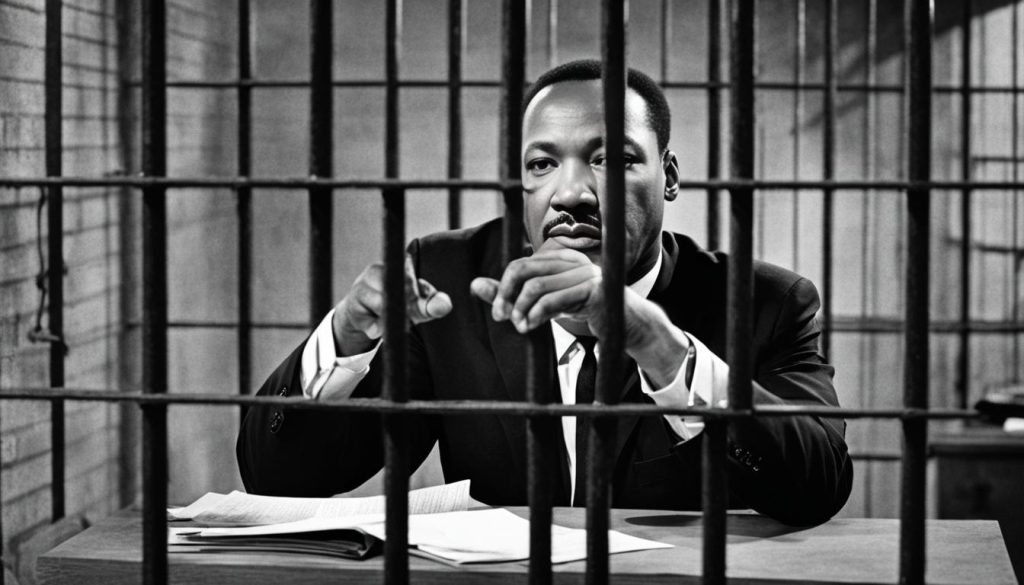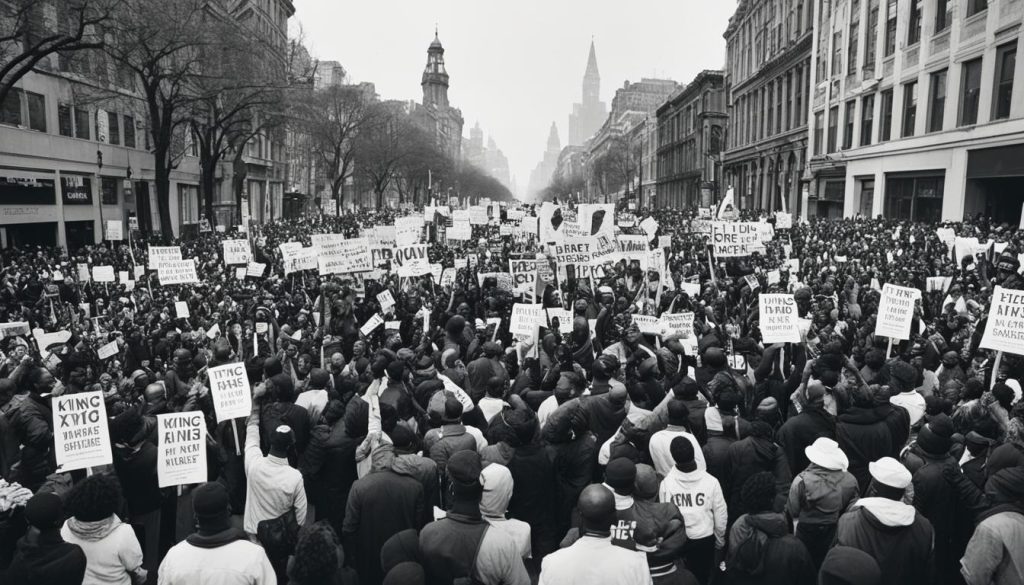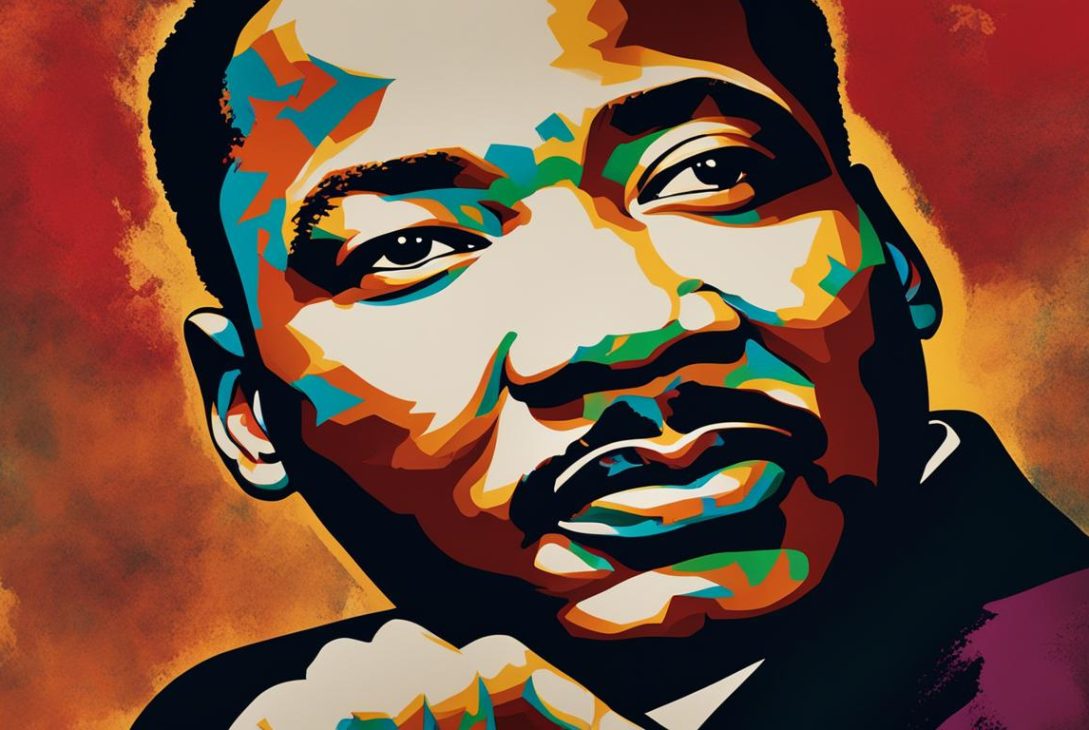Martin Luther King Jr. was one of the most influential African American leaders in history. His tireless advocacy for civil rights and his commitment to nonviolent resistance made him a beacon of hope and inspiration for millions of people around the world. This article provides a comprehensive biography of Martin Luther King Jr., exploring the man behind the iconic speeches and examining his enduring legacy as one of the most influential African American leaders.
Key Takeaways:
- Martin Luther King Jr. was an influential African American leader who played a crucial role in the civil rights movement.
- He advocated for nonviolent resistance and believed in the power of love and equality.
- King’s activism and leadership continue to inspire individuals and communities to fight for justice and equality.
- His legacy as an influential African American leader remains relevant and serves as a guide for addressing social and political challenges.
- Martin Luther King Jr.’s vision of a more inclusive and just world continues to resonate today.
King Was Not Always Popular
Despite his eventual widespread acclaim, Martin Luther King Jr. was not always popular during his lifetime. His ideas challenged the status quo and the established order, leading to him being vilified, harassed, and eventually murdered. Despite these challenges, King remained resilient in the face of adversity, demonstrating his commitment to his beliefs and activism. His legacy continues to inspire others to stand up for justice and equality.
The Impact of Martin Luther King Jr.’s Activism
Martin Luther King Jr.’s activism had a significant impact on the civil rights movement and American society as a whole. His advocacy for racial equality, nonviolent resistance, and equal rights for all citizens shaped public discourse and challenged prevailing prejudices. Through his powerful speeches, peaceful protests, and commitment to justice, King sparked a wave of activism and inspired a generation of individuals to fight for their rights.
“The ultimate measure of a man is not where he stands in moments of comfort and convenience, but where he stands at times of challenge and controversy.” – Martin Luther King Jr.
The Legacy of Martin Luther King Jr.’s Activism
The legacy of Martin Luther King Jr.’s activism continues to reverberate through generations. His tireless efforts paved the way for significant progress in civil rights legislation, desegregation, and voting rights. King’s message of equality, peace, and justice remains relevant today, inspiring individuals and communities to address systemic discrimination and work towards a more inclusive society.
Although King faced opposition and adversity during his lifetime, his unwavering dedication to his cause made him an icon of courage, resilience, and hope. His legacy serves as a reminder that one person’s commitment to justice and equality can create lasting change.
King’s Non-Violence Stance Was Not Always so Certain
One of Martin Luther King Jr.’s notable achievements was his advocacy for nonviolent resistance. However, it is important to note that King did not always subscribe to this belief. Early on in his work, he believed in self-defense and even purchased firearms to protect his family. However, through influential mentors and exposure to Gandhi’s teachings, King shifted towards nonviolence as a powerful tool for social change. This change in stance played a significant role in his activism and continues to be a defining aspect of his legacy.
King’s evolution towards nonviolence was influenced by his deep commitment to justice and equality. He closely studied the success of Gandhi’s nonviolent resistance movements in India, recognizing the transformative power of peaceful protest. This realization propelled King to embrace nonviolence as a strategy to challenge racial injustice in America.
In his famous “Letter from Birmingham Jail,” King highlighted the moral imperative of nonviolent direct action in the face of injustice. He eloquently wrote, “One has not only a legal but a moral responsibility to obey just laws. Conversely, one has a moral responsibility to disobey unjust laws.” This quote encapsulates King’s belief in the power of nonviolence to expose the unjust systems that perpetuate discrimination and inequality.
“Nonviolence is a powerful and just weapon, which cuts without wounding and ennobles the man who wields it.
It is a sword that heals.”
King’s adoption of nonviolent resistance not only inspired the civil rights movement but also paved the way for peaceful social change around the world. His commitment to nonviolence served as a guiding principle for countless activists seeking justice and equality.
Today, King’s emphasis on nonviolence remains relevant in the ongoing struggle for social justice. His powerful example reminds us that lasting change can be achieved through peaceful means, even in the face of immense adversity.
Influence of Mentors
King’s transformation towards nonviolence was influenced by his encounters with influential mentors. One such mentor was Howard Thurman, a prominent African American theologian and civil rights leader. Thurman introduced King to the principles of nonviolent resistance and played a crucial role in shaping his worldview.
Additionally, King’s exposure to the teachings of Mohandas Gandhi, the leader of India’s independence movement, had a profound impact on his beliefs. Gandhi’s philosophy of nonviolent protest and civil disobedience resonated with King, strengthening his commitment to nonviolence as a transformative force for social change.
| Influential Mentors | Impact on King’s Nonviolent Stance |
|---|---|
| Howard Thurman | Introduced King to the principles of nonviolent resistance |
| Mohandas Gandhi | Inspired King with his philosophy of nonviolent protest |
King’s “Letter from a Birmingham Jail” Addresses His Critics

In his powerful and thought-provoking “Letter from a Birmingham Jail,” Martin Luther King Jr. directly confronted his critics, particularly his fellow clergymen who questioned his approach to the civil rights movement. This letter, composed during his incarceration in April 1963, served as a response to an open letter from white clergymen cautioning against the movement’s actions and urging patience. King skillfully and eloquently defended his activism, addressing the concerns raised by his detractors while passionately asserting the urgency for social change.
“You deplore the demonstrations that are presently taking place… But I am sorry that your statement… fails to express a similar concern for the conditions that brought about the demonstrations.”
In this letter, King acknowledged the criticisms leveled against him, demonstrating a willingness to engage with differing perspectives. However, he refused to retreat or compromise on his commitment to justice, equality, and freedom. King passionately articulated the moral imperative to challenge and dismantle institutionalized racism, highlighting the struggles faced by marginalized communities and the necessity of direct action in the face of injustice. His letter masterfully weaves together moral arguments, historical references, and theological insights to underscore the urgency of the civil rights movement.
King’s response to his critics in the “Letter from a Birmingham Jail” exemplifies his ability to respond with patience and reason, even in the face of adversity. He recognized that progress towards racial equity would require uncomfortable conversations, urging society to confront the harsh realities of racial discrimination rather than sweep them under the rug. His unwavering dedication to nonviolent protest and perseverance in the face of opposition solidified his status as a transformative leader, whose influence continues to resonate with activists and advocates today.
Addressing Fundamental Criticisms
Within the letter, King methodically addressed some of the key criticisms and misconceptions surrounding the civil rights movement. He tackled the criticism that protest action was untimely, arguing that the urgency of justice could not be constrained by arbitrary timetables. Furthermore, he refuted claims that outsiders were responsible for civil unrest, asserting that those advocating for equality were, in fact, inextricably connected to the communities they fought for.
The Power of Direct Action
Central to King’s response was his defense of nonviolent direct action. He eloquently articulated the moral imperative to confront injustice head-on, drawing inspiration from historical figures such as Socrates, Jesus, and Paul. King posited that nonviolent protest and civil disobedience were the most effective tools in raising awareness and compelling society to acknowledge and address systemic inequalities.
A Testament to King’s Legacy
The “Letter from a Birmingham Jail” not only addressed his immediate critics but also encapsulated the essence of Martin Luther King Jr.’s tireless advocacy for justice and equality. His profound insights, intellectual rigor, and unwavering commitment to nonviolence reverberated far beyond the confines of his jail cell, leaving an indelible mark on the civil rights movement and the broader struggle for social justice.
Deeper Concepts in King’s “I Have a Dream Speech” Often Missed
Martin Luther King Jr.’s iconic “I Have a Dream” speech is often remembered for its powerful ending, but there are deeper concepts within the speech that are frequently overlooked. In particular, King emphasized the need to make democracy’s promises a reality and to lift the nation from the quicksands of racial injustice. These concepts are still relevant today as the fight for racial equality continues.
“I have a dream that one day this nation will rise up and live out the true meaning of its creed – We hold these truths to be self-evident: that all men are created equal.”
In his speech, King vividly described his dream of a future where racial discrimination and segregation were eradicated, and equality prevailed. However, beyond the passionate words and memorable phrases, King’s speech called attention to the persistent inequalities that plagued American society during the civil rights movement.
King highlighted the importance of not merely settling for symbolic gestures or superficial changes but actively working to transform the existing structures of power, dismantling racial injustice at its core. He stressed the need for substantive changes that would address the systemic barriers preventing African Americans from experiencing true equality and justice.
These deeper concepts within the “I Have a Dream” speech reflect King’s understanding of the civil rights movement as a struggle for fundamental transformation and a call to action for individuals and institutions to confront and challenge racism head-on.
The continuing relevance of King’s message is evident in ongoing conversations about racial inequality, police brutality, and the need for comprehensive social change. King’s words continue to inspire individuals to advocate for justice, challenge oppressive systems, and actively contribute to the ongoing quest for civil rights and equality.
King’s Popularity and Legacy
Despite facing initial unpopularity, Martin Luther King Jr. emerged as one of the most influential African American leaders in history. His ideas and activism continue to inspire generations of individuals striving for equality and justice.
King’s legacy has grown over time, solidifying his place among influential African American leaders. His unwavering dedication to civil rights and his powerful speeches have left an indelible mark on society.
Today, King’s popularity remains strong as his teachings resonate with people from all walks of life. His powerful messages of love, nonviolence, and social change continue to guide and inspire those seeking to break down barriers and create a more equitable world.
“Darkness cannot drive out darkness; only light can do that. Hate cannot drive out hate; only love can do that.” – Martin Luther King Jr.
Martin Luther King Jr.’s Impact
Through his activism, King became a symbol of hope and resilience. His leadership during the civil rights movement challenged the status quo and led to significant progress in the fight against racial discrimination.
His famous “I Have a Dream” speech, delivered during the 1963 March on Washington, remains one of the most iconic moments in American history. In it, King eloquently expressed his vision of a society free from racial inequality, where individuals are judged by the content of their character rather than the color of their skin.
King’s legacy extends far beyond his words. His actions, such as organizing peaceful protests and advocating for legislative change, were instrumental in advancing civil rights and inspiring future generations of activists.
The Continuing Relevance of Martin Luther King Jr.
Even decades after his death, Martin Luther King Jr.’s teachings are as relevant and impactful as ever. His emphasis on peaceful protest, nonviolent resistance, and the power of love continues to inspire movements for social justice around the world.
King’s teachings are a reminder that the fight for equality is ongoing and that progress requires the collective effort of individuals dedicated to dismantling systemic oppression.
“Our lives begin to end the day we become silent about things that matter.” – Martin Luther King Jr.
Legacy Comparison of Influential African American Leaders
| Leader | Contributions | Impact |
|---|---|---|
| Harriet Tubman | Underground Railroad, abolitionist | Escaped slavery and helped others achieve freedom, fought for women’s suffrage |
| Barack Obama | First African American President of the United States | Inspired a new generation, symbolized progress in racial equality |
| Angela Davis | Civil rights activist, scholar | Advocated for prison abolition, intersectional feminism, and racial justice |
| Malcolm X | Nation of Islam, civil rights activist | Advocated for self-defense, black pride, and pan-Africanism |
Progress Made Since King’s Time

Martin Luther King Jr.’s activism and leadership during the civil rights movement paved the way for significant progress in terms of racial reconciliation and equality. His courageous efforts and unwavering commitment to justice inspired countless individuals to fight for their rights.
Since King’s time, there have been notable advancements in dismantling systemic racism and promoting equality. Legislation such as the Civil Rights Act of 1964 and the Voting Rights Act of 1965 helped secure fundamental rights for marginalized communities.
Equal access to education, employment, and housing has improved, although disparities still exist. African Americans and other minority groups have seen greater representation in areas such as politics, business, and entertainment.
However, it is crucial to critically assess the progress made and acknowledge that the work is far from over. While strides have been taken, racial inequality persists in many aspects of society.
Institutional racism continues to perpetuate disparities in criminal justice, healthcare, and economic opportunities. Systemic biases and prejudices persist, leading to the disproportionate surveillance, incarceration, and mistreatment of people of color.
“Let us all hope that the dark clouds of racial prejudice will soon pass away and the deep fog of misunderstanding will be lifted from our fear-drenched communities.” – Martin Luther King Jr.
To truly honor King’s legacy and his vision of an equitable society, there must be an ongoing commitment to addressing these institutional barriers. Individuals must engage in uncomfortable conversations and advocate for policy changes that promote equal rights and opportunities for all.
Education plays a vital role in challenging biases and fostering empathy. By incorporating diverse perspectives and histories into curricula, we can work towards a more inclusive and understanding society.
Furthermore, individuals must actively engage in anti-racist work, amplifying the voices of marginalized communities and pushing for systemic change. This requires recognizing one’s own privileges, confronting personal biases, and actively working to dismantle systems of oppression.
Remaining Challenges:
- Institutional racism and systemic biases
- Disparities in criminal justice and law enforcement
- Economic inequalities
- Healthcare disparities
It is crucial to remember that progress is a continuous journey, and King’s fight for justice and equality should continue to inspire us. By raising awareness, challenging the status quo, and advocating for meaningful change, we can honor King’s legacy and create a more just and equitable society for future generations.
King’s Views on Economic Equality
Martin Luther King Jr. was not only an advocate for racial equality but also a proponent of economic justice. He firmly believed that everyone should have equal access to basic necessities and opportunities, regardless of their race or socioeconomic background. King recognized that racial discrimination and economic inequality were interconnected issues that needed to be addressed together in order to create a more just and equitable society.
Despite the significance of King’s views on economic equality, they have often been overlooked or overshadowed by his stance on racial issues. However, his speeches and writings reveal a deep understanding of the systemic barriers that keep people trapped in poverty and limit their access to economic opportunities.
“We must…realize that the problems of racial injustice and economic injustice cannot be solved without a radical redistribution of political and economic power.”
– Martin Luther King Jr.
Social and Economic Justice
King emphasized that achieving true equality required addressing the root causes of poverty and creating a society where everyone could thrive. He recognized that economic disparities disproportionately affected African Americans and other marginalized communities, perpetuating a cycle of poverty and limited opportunities.
King’s vision of a more just and inclusive society encompassed both racial and economic equality. He advocated for policies that would uplift the disadvantaged and provide equal access to education, employment, and affordable housing. His belief in economic justice extended to advocating for fair wages, workers’ rights, and the eradication of discriminatory practices in the job market.
Relevance Today
King’s views on economic equality are still highly relevant in today’s society, as income and wealth disparities persist. The COVID-19 pandemic has further exposed these inequalities, as marginalized communities bear the brunt of the economic fallout.
Many of the economic challenges that King sought to address, such as poverty, inadequate healthcare, and limited economic mobility, continue to impact communities of color. The fight for economic justice remains an integral part of the broader struggle for social and racial justice, and King’s teachings continue to inspire and guide those advocating for a more equitable society.
| Economic Equality Measures | Importance |
|---|---|
| Equal access to quality education for all | Ensures that everyone has the opportunity to succeed regardless of their socioeconomic background. |
| Fair wages and workers’ rights | Prevents exploitation and ensures that workers are fairly compensated for their labor. |
| Elimination of discriminatory practices in the job market | Creates equal opportunities for employment and reduces disparities based on race or gender. |
| Access to affordable housing | Ensures that everyone has a stable and affordable place to live. |
King’s Relevance Today
If Martin Luther King Jr. were alive today, his wisdom and insights would have a tremendous impact on the current state of society. His speeches and quotes continue to resonate with people who are passionate about social justice and equality. King’s message of love, nonviolence, and activism serves as a powerful source of inspiration for individuals and communities striving to create a more inclusive and just world.
Throughout his life, Martin Luther King Jr. delivered numerous captivating speeches that addressed the urgent need for equality and justice. His words, filled with passion and conviction, still hold great relevance today. In particular, King’s speeches about racial discrimination and the fight for civil rights serve as a reminder of the ongoing struggle to eradicate racism from society.
“I have a dream that my four little children will one day live in a nation where they will not be judged by the color of their skin but by the content of their character.”
“Darkness cannot drive out darkness; only light can do that. Hate cannot drive out hate; only love can do that.”
King’s quotes are widely shared and celebrated, not only for their eloquence but also for their profound truths. They encapsulate the essence of his teachings and continue to resonate with individuals striving to create positive change around the world.
In these turbulent times, King’s ideas and principles serve as a guiding light. His commitment to nonviolence, his emphasis on building bridges of understanding, and his call for individual and collective action resonate deeply with those seeking to address systemic injustices and create a more harmonious society.
Martin Luther King Jr.’s Quotes:
- “The time is always right to do what is right.”
- “Injustice anywhere is a threat to justice everywhere.”
- “Our lives begin to end the day we become silent about things that matter.”
- “The ultimate measure of a man is not where he stands in moments of convenience and comfort, but where he stands at times of challenge and controversy.”
The enduring relevance of Martin Luther King Jr. and his message is a testament to the impact he made during his lifetime. His words continue to inspire, challenge, and motivate individuals to work towards a more just and equitable world.
| Legacy of Martin Luther King Jr. | Relevance Today |
|---|---|
| Championed civil rights | Inspires advocacy for racial justice |
| Promoted nonviolence | Encourages peaceful protests and social change |
| Advocated for equality and justice | Serves as a guide for addressing systemic injustices |
Conclusion
Martin Luther King Jr. was a remarkable man whose activism and leadership left a lasting impact on society. His unwavering commitment to justice, equality, and freedom serves as a powerful inspiration for individuals striving to make a difference. King’s legacy as an influential African American leader continues to resonate, reminding us of the importance of standing up against injustice.
Throughout his life, Martin Luther King Jr. demonstrated the power of peaceful protest and nonviolent resistance. His dedication to activism, coupled with his powerful speeches and quotes, sparked a movement that brought about significant social and political change. His words continue to inspire individuals to take action and fight for a more inclusive and equitable society.
Today, as we face ongoing social and political challenges, we can look to Martin Luther King Jr.’s life and work as a guide. His emphasis on love, compassion, and standing up for what is right serves as a timeless reminder of the values we should uphold. King’s activism paved the way for progress, and his legacy reminds us that we all have a role to play in creating a more just and inclusive world.
FAQ
Who was Martin Luther King Jr.?
Martin Luther King Jr. was a highly influential African American leader who played a crucial role in the civil rights movement. He is known for his advocacy for racial equality, nonviolent resistance, and economic justice.
What were some of Martin Luther King Jr.’s achievements?
Martin Luther King Jr. achieved numerous accomplishments during his lifetime. Some of his notable achievements include his leadership in the civil rights movement, advocacy for nonviolent resistance, and his famous “I Have a Dream” speech.
How did Martin Luther King Jr. respond to his critics?
Martin Luther King Jr. directly addressed his critics in his “Letter from the Birmingham Jail.” In this letter, he acknowledged their criticisms while emphasizing the urgency and importance of his activism.
What are some overlooked concepts in Martin Luther King Jr.’s “I Have a Dream” speech?
While the powerful ending of his speech is often remembered, there are deeper concepts within it that are frequently overlooked. King emphasized the need to make democracy’s promises a reality and to uplift the nation from the quicksands of racial injustice.
What is Martin Luther King Jr.’s legacy?
Martin Luther King Jr.’s legacy is one of profound influence and inspiration. His ideas and activism continue to inspire individuals and communities to strive for justice, equality, and freedom.
What progress has been made since Martin Luther King Jr.’s time?
While Martin Luther King Jr.’s activism and leadership led to significant progress in terms of racial reconciliation and equality, there is still work to be done to address institutional racism and create a more equitable society.
What were Martin Luther King Jr.’s views on economic equality?
Martin Luther King Jr. advocated for economic justice and believed that everyone should have access to basic necessities and opportunities. His ideas about economic equality are often overlooked but remain relevant today.
How is Martin Luther King Jr. relevant today?
Martin Luther King Jr.’s speeches and quotes still resonate with people seeking social justice and equality. His message of love, nonviolence, and activism continues to inspire individuals and communities to work towards a more inclusive and just world.
What was Martin Luther King Jr.’s significance as an African American leader?
Martin Luther King Jr. is one of the most influential African American leaders in history. His activism and leadership paved the way for significant progress in terms of racial equality and social justice.
Source Links
- https://kinginstitute.stanford.edu/introduction
- https://nkytribune.com/2024/01/our-rich-history-taking-a-deeper-look-at-what-king-believed-his-ideas-were-unpopular-in-his-time/
- https://www.democracyandme.org/martins-ideas-a-more-in-depth-look-at-dr-martin-luther-king-jr/
Martin Luther King Jr: An In-Depth Look at the Man Martin Luther King Jr. was an influential African American leader who played a crucial role in the civil rights movement. national holiday - martin luther king jr day
Last modified: January 17, 2024





